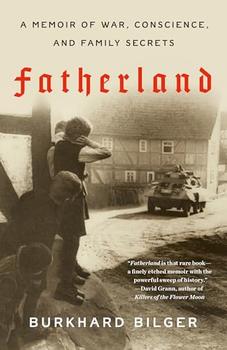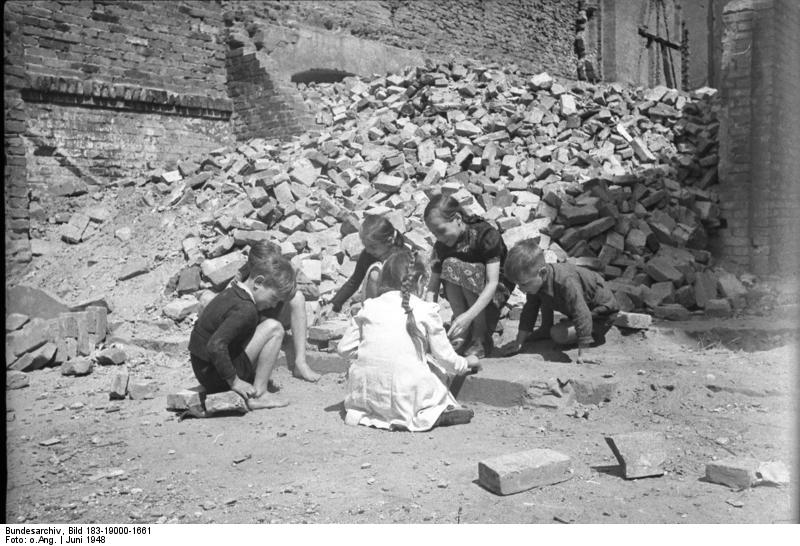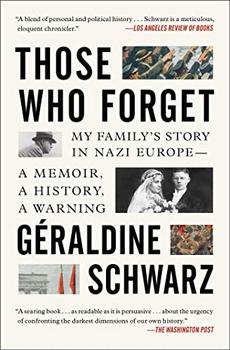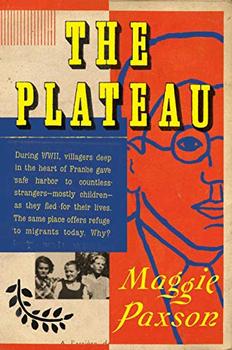Summary | Excerpt | Reading Guide | Reviews | Beyond the book | Read-Alikes | Genres & Themes | Author Bio

Critics' Opinion:
Readers' Opinion:
First Published:
May 2023, 336 pages
Paperback:
Jun 4, 2024, 336 pages
 Book Reviewed by:
Book Reviewed by:
Elisabeth Herschbach
Buy This Book
A New Yorker staff writer investigates his grandfather, a Nazi Party Chief, in this "unflinching, gorgeously written, and deeply moving exploration of morality, family, and war" (Patrick Radden Keefe, author of Empire of Pain).
As a boy growing up in Oklahoma, Burkhard Bilger often heard his parents tell stories about the Germany of their youth. Winters in the Black Forest, when the snow piled up to the eaves and haunches of smoked speck hung from the rafters. Springtime along the Rhine, when the storks came home to nest on rooftops. His parents were born in 1935 and had lived through the Second World War, but those stories, vivid as they were, had strange omissions. His mother was a historian, yet she rarely talked about her father's relationship to the Nazis, or his role in the war. Then one day a packet of letters arrived from Germany, yellowed with age, and a secret history began to unfold.
Karl Gönner was an elementary school teacher and father of four when the war began. In 1940, he was posted to a village in Alsace, in occupied France, and ordered to reeducate its children—to turn them into proper Germans. He was a loyal Nazi when he arrived, but as the war went on his allegiance wavered. According to some villagers, he risked his life shielding them from his own party's brutalities. According to others, he ruled the village with an iron fist. After the war, Gönner was charged with giving an order that led police to beat a local farmer to death. Was he guilty or innocent? A war criminal or just an ordinary man, struggling to do right from within a monstrous regime?
Fatherland is the story of Bilger's nearly ten-year quest to uncover the truth. It is a book of gripping suspense and moral inquiry—a tale of chance encounters and serendipitous discoveries in archives and villages across Germany and France. Long admired for his profiles in The New Yorker, Bilger brings the same open-hearted curiosity to his grandfather's story and the questions it raises. What do we owe the past? How can we make peace with it without perpetuating its wrongs? Intimate and far-reaching, Fatherland is an extraordinary odyssey through the great upheavals of the past century.
1
Suspect
The man in the interrogation room had all the marks of a dangerous fanatic: stiff spine and bony shoulders, lips pinched into a pleat. He wore brass spectacles with round, tortoiseshell rims and his head was shaved along the back and sides, leaving a shock of brown hair to flop around on top, like a toupee. When he posed for his mug shot, his expression was strangely unbalanced. The left eye had a flat, unwavering focus, edged with fear or grief. The right eye was glazed and lifeless.
The French inspector, Otto Baumgartner, paced in front of him reading from a typewritten sheet. "In October of 1940, you moved to Alsace and set yourself the task of converting the inhabitants of Bartenheim to National Socialism," he began. "You established yourself as Ortsgruppenleiter in order to become the town's absolute master. . . . You brought to your duties a zeal and a tyrannical fervor without equal! In the entire district of Mulhouse, you were the most feared and ...
Embedding Gönner's story into the larger context of the era, Fatherland traces his life from the rural village in the Black Forest where he grew up to the battlefields of northern France where he lost an eye in the First World War, and from Bartenheim in German-occupied Alsace to the hilltop fortress where he was imprisoned after the war. The result is both a deeply personal family portrait and an insightful and fascinating wartime history. But while Fatherland is a work of history, it is also a book about the present, about history's effect on us today. What do we owe the past? How do we come to terms with our fraught family legacies? While Bilger wrestles with these questions in the context of his German ancestry, their relevance is far broader...continued
Full Review
 (867 words)
(867 words)
(Reviewed by Elisabeth Herschbach).
 Atul Gawande, author of Being Mortal
Fatherland is the book we need right now. Gripping, gorgeously written, and deeply humane, it's both a moving personal history and a formidable piece of detective work. Bilger wrestles with one of the essential questions of our time: How can we make peace with our ancestors' past?
Atul Gawande, author of Being Mortal
Fatherland is the book we need right now. Gripping, gorgeously written, and deeply humane, it's both a moving personal history and a formidable piece of detective work. Bilger wrestles with one of the essential questions of our time: How can we make peace with our ancestors' past? David Grann, author of Killers of the Flower Moon
Burkhard Bilger has long been one of our great storytellers: an acute observer, an intrepid reporter, and a writer of unmatched grace. Now he has brought these gifts to his own family story, rummaging through the past to unearth long-kept secrets and to shed light on the nature of war and complicity. Fatherland is that rare book—a finely etched memoir with the powerful sweep of history.
David Grann, author of Killers of the Flower Moon
Burkhard Bilger has long been one of our great storytellers: an acute observer, an intrepid reporter, and a writer of unmatched grace. Now he has brought these gifts to his own family story, rummaging through the past to unearth long-kept secrets and to shed light on the nature of war and complicity. Fatherland is that rare book—a finely etched memoir with the powerful sweep of history. Eric A. Johnson, Professor of History at Central Michigan University and author of Nazi Terror
Fatherland reads like a novel even as it provides important contributions to the history of the Second World War. Bilger weaves together oral history, family memories, and archival documents, bringing to life both the Nazi administration and the real lives of French and German people. His book is both a plausible and well-supported argument about the guilt and innocence of his grandfather, and a model for others trying to resolve their own painful family histories.
Eric A. Johnson, Professor of History at Central Michigan University and author of Nazi Terror
Fatherland reads like a novel even as it provides important contributions to the history of the Second World War. Bilger weaves together oral history, family memories, and archival documents, bringing to life both the Nazi administration and the real lives of French and German people. His book is both a plausible and well-supported argument about the guilt and innocence of his grandfather, and a model for others trying to resolve their own painful family histories. Patrick Radden Keefe, author of Empire of Pain
A profoundly haunting work of historical investigation, a reporter's dogged inquiry into the tangled history of his Nazi grandfather ... Fatherland is an unflinching, gorgeously written, and deeply moving exploration of morality, family, and war.
Patrick Radden Keefe, author of Empire of Pain
A profoundly haunting work of historical investigation, a reporter's dogged inquiry into the tangled history of his Nazi grandfather ... Fatherland is an unflinching, gorgeously written, and deeply moving exploration of morality, family, and war. In Fatherland, New Yorker staff writer Burkhard Bilger chronicles his quest to understand his maternal grandfather's Nazi past—a past shrouded in mystery despite the fact that Bilger's mother, born in 1935, was old enough at the time to have memories of World War II and her father's role in it.
In Fatherland, New Yorker staff writer Burkhard Bilger chronicles his quest to understand his maternal grandfather's Nazi past—a past shrouded in mystery despite the fact that Bilger's mother, born in 1935, was old enough at the time to have memories of World War II and her father's role in it.
She remembered her father wearing his brown uniform with a Nazi eagle on the cap and black swastika on the sleeve. She knew he had been tried and imprisoned for war crimes. Yet she had never asked him what he did during the war. Even when she went on to study the history of the era as an adult, writing her doctoral dissertation on the German occupation of France and the Vichy regime, Bilger's mother couldn't bring herself to investigate her...

If you liked Fatherland, try these:

by Géraldine Schwarz
Published 2022
Those Who Forget, published to international awards and acclaim, is journalist Géraldine Schwarz's riveting account of her German and French grandparents' lives during World War II, an in-depth history of Europe's post-war reckoning with fascism, and an urgent appeal to remember as a defense against today's rise of far-right nationalism.

by Maggie Paxson
Published 2019
During World War II, French villagers offered safe harbor to countless strangers - mostly children - as they fled for their lives. The same place offers refuge to migrants today. Why?




Every good journalist has a novel in him - which is an excellent place for it.
Click Here to find out who said this, as well as discovering other famous literary quotes!
Your guide toexceptional books
BookBrowse seeks out and recommends the best in contemporary fiction and nonfiction—books that not only engage and entertain but also deepen our understanding of ourselves and the world around us.